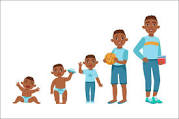stages of child growth and development
GROWTH AND DEVELOPMENT STAGES OF A CHILD
Child development is a complex and ongoing process that occurs in a series of stages. These stages are marked by changes in physical, cognitive, social, and emotional development. As a child grows, they pass through these stages in a predictable sequence, each building upon the skills and abilities gained in the previous stage. In this article, we will explore the stages of development in children and the milestones associated with each stage.

Stage 1: Infancy (Birth to 18 Months)
The first stage of development begins at birth and extends until 18 months of age. Infants are entirely dependent on their caregivers for survival during this stage. Physical development is rapid during this stage, with the infant gaining control of their movements, such as crawling, sitting up, and walking. Cognitive development involves learning through exploration and developing basic problem-solving skills. Social development is limited to the interaction with caregivers, and emotional development is centered around bonding and attachment.
Early Childhood (2-6 years)
The early childhood stage is a period of dramatic cognitive and social-emotional development. Children's language skills expand rapidly, allowing them to express their thoughts, feelings, and needs more effectively. They become more independent and curious, eager to explore their surroundings and engage in imaginative play. Children's motor skills also improve, enabling them to run, jump, climb, and manipulate objects with greater precision. In terms of social development, children begin to form friendships, learn to share, take turns, and follow rules. They also become more aware of gender roles and cultural norms, which can shape their identity and attitudes.
Stage 3: Preschool (3-5 years)
The preschool years, which typically span from ages three to five, are a time of rapid development in many areas. Children are refining their motor skills, learning to control their bodies and coordinate their movements. They are also developing their cognitive skills, including memory, attention, and problem-solving abilities. Language skills continue to improve, and children begin to use more complex sentences and engage in conversations with others. Social development is also a key focus of this stage, as children learn to play with others, take turns, and cooperate in groups.
Middle childhood (6-11 years old)
In the middle childhood, children continue to grow physically and reach their peak physical performance. They become more coordinated, have better balance and agility, and are able to engage in in more complex physical activities. Cognitive development in middle childhood includes the development of critical thinking skills, problem solving abilities, and the ability to think abstractly. Children also develop a greater sense of self awareness and their emotions become more nuanced.
Adolescence (12-18years)
Adolescence is a period of rapid change and transition. Physical development during adolescence includes puberty, which results in significant changes in the body shape, size and function. Adolescents also become more independent and start to form their own identities separate from their families.
In conclusion, it is important to note that these stages are not set in stone and children may develop at different rates and times. However, understanding the typical milestones of child support growth and development can help parents and caregivers provide appropriate support and guidance throughout each stage. By providing a supportive environment for children to grow and develop, they can reach their full potential and thrive.
Life Lessonsin LETS CREATE SOMETHING and in 4 more groups
Articles from Peter Katana
View blog
UFOS, ALIENS AND EXTRATERRESTRIALS · Table of contents · Contents · Table of contents. · 1 · Sources ...

Search engine optimization (SEO) writing is a technique used to optimize your content for search eng ...

Parenting can be both rewarding and challenging. Raising a child is a huge responsibility and requir ...
Related professionals
You may be interested in these jobs
-

Green-Gray Infrastructure
5 days ago
World Resources Institute (WRI) Nairobi, Kenya Full timeThe World Resources Institute is a global research non-profit organization that was established in 1982 with funding from the MacArthur Foundation under the leadership of James Gustave Speth. WRI is a global research organization that turns big ideas into action at the nexus of e ...
-

Impact Coordinator at
1 week ago
African Leadership University (ALU) Nairobi, Kenya Full timeThe African Leadership University is at the beginning of a rapid growth spurt, expanding its student numbers, course offerings, and campus locations. Over the next 5-7 years, it expects its student numbers to grow from the current 360 (on one campus) to over 25,000 (distributed ...
-

Senior Consulting Sales Manager
1 day ago
Oracle Nairobi, Kenya Full timeOracle Corporation is an American multinational computer technology corporation, headquartered in Redwood City, California. · Brief Description of the Role: · The existing vacancy is for a seasoned banking software application sales person to position and sell Consulting Services ...
Comments